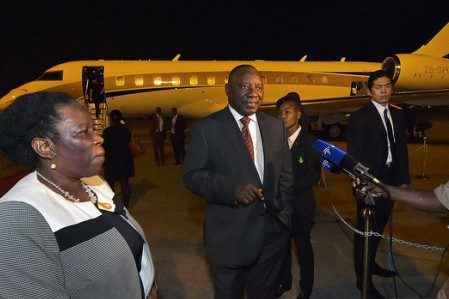
Cyril Ramaphosa is the deputy president of South Africa, and indications are that the African National Congress (ANC) will promote this pragmatic man to its top leadership position. South Africans have divided views on his ability to direct and govern should Ramaphosa become president of the country. Many believe he is not presidential material for South Africa.
Ramaphosa lacks the charisma and gravitas necessary to lead, inspire, and manage. His immense wealth, which appears to be a result of white largesse and government expenditure rather than sweat and toil, is his first liability. Perhaps the reason for the negative feelings toward him from the majority is his nonchalant attitude toward the Markikana killing and his link to this disaster.
Ramaphosa appears to lack confidence in his ability to lead and rarely makes eye contact with his audience. His body language projects the absence of self-confidence, especially in parliament where Ramaphosa has many critics. Several individuals have indicated that Ramaphosa causes people to become extremely nervous, and that South Africans sense a possible dictatorship should he become president. People are feeling that he has a peculiar mindset, and say they never understand what the man thinks. Ramaphosa appears to be a leader who will not speak from the heart, causing people to remain distant toward the cold-heartedness he displays.
Ramaphosa recently chartered a plane from the controversial Gupta family, which shows a shocking lack of wisdom and arrogance. The Gupta family was involved in a serious breach of security after the illegal landing of a foreign plane at Waterkloof Air Force Base two years ago. The arrival of the plane was a security risk, however, there was never any prosecution and the incident was swept under the carpet to be forgotten. Many believe that Ramaphosa did not have a choice, as the Guptas are close friends of President Zuma, the current president of South Africa.
Others believe Ramaphosa is a vulture and that he will depend on patronage and ruthlessness to achieve and maintain power. Ramaphosa is perceived as a project of multinational corporations which consist of white capital’s foreign interests which fade into oblivion after their obscene wealth accumulation is complete. Ramaphosa is following the law of acquiring power, and one can never outclass the master. The man is keeping a low profile in an attempt not to rattle the cage too much, or be seen as swimming against the current of corruption and abuse of office.
Not all people of South Africa have negative attitudes toward Ramaphosa, and many remember the time when the man was a true fighter for peace, justice, and freedom; when he was equal to all the people who suffered and triumphed over hardship, and when ANC leaders displayed impeccable character. Many believe that Ramaphosa can bring back dignity into the office of the presidency.
People want Ramaphosa to clarify and explain the corruption and the absence of good governance. The neglect of defining the abuse of power in the provincial and local government has caused a lack of confidence in him, and many realize that the unanswered questions are Ramaphosa’s greatest fault.
Ramaphosa is described as a conflicted and compromised person. People believe that the presidency has demonstrated that people who have been involved in the private sector do not make honest presidents. There is the perception that Ramaphosa needs to boast ruling president Jacob Zuma in an attempt to fend off all other challengers. Under scrutiny, many believe that all ANC leaders are implicated in some allegation.
Can Ramaphosa walk the tightrope between transformational and transactional leadership? Over the last 21 years, ascendancy to political power entailed bending the rules and making alliances with unsavory characters. Patronage is required, and even morally upright people make promises and reward people in return for loyalty. Ramaphosa might have to act with circumspection and magnanimity toward the good, the bad, and the ugly. He will not be too different, as the roots of this culture run deep in the enjoyment of the patronage of big business and politicians. Greedy and aggressive, somewhere between hope and despair, the Marikana and eToll fiasco caused many to lose confidence in the man who once showed potential to lead South Africa.
Opinion by Laura Oneale
No comments:
Post a Comment